Abstract
The article considers the current status of mathematics literacy of primary school students in the context of the international research conducted by IRSA, as well as the factors supporting mathematical competence of students and role of curricula and textbooks in formation of student achievements in mathematics provided in schools characterized by the Kyrgyz language of instruction. The methodology for analysis of the content of the 4th grade textbook for schools with the Kyrgyz language of instruction is provided and the constructive specifics of mathematics tests, adaptation and localization of a tool included in the SAMtool package in a foreign language environment are also considered. SAM tool adaptation includes: translation of tests into the Kyrgyz language, verification at the national level, verification at the international level, approbation, test content analysis. Tool localization includes: preparation of final versions of tests, their translation into Kyrgyz, translation of questionnaires for students and teachers, conducting a workshop in district education departments with school coordinators, conducting a full-scale localization in individual districts and cities of Kyrgyzstan on the basis of sampling, processing and analysis of data. After interpreting results of the conducted international research of primary school students in the Kyrgyz Republic some conclusions and recommendations have been made in order to improve the overall quality of mathematics education in primary schools of the republic.
Keywords: Achievement stages, cognitive skills, mathematical literacy, state educational standard, SAM tool
Introduction
Development of the Program of Education applied in the Kyrgyz Republic for 2021-2040 was intended to introduce and implement reforms laid in the Strategy for Education Development in the Kyrgyz Republic for 2012-2020 approved by the Government of the Kyrgyz Republic on March 23, 2012 (No. 201) and to identify the state policy vector in the field of education (Ministry of Justice of the Kyrgyz Republic, 2021). The a priori idea contained in the adopted documents was to develop a mechanism of transition to result-oriented education. The society's need to improve education and to take necessary measures for its betterment is conditioned by requirements of the high level of education and intellectual potential, desire to achieve human progress in different spheres of activity, including sustainable development of the country as a whole. The needs of the country can also include the desire of the Kyrgyz Republic government to ensure integration into the world culture system, which requires taking into account achievements of international educational practices (Froumin et al., 2018).
It should be also noted that the basic mathematical knowledge, skills and ideas of primary school students are required for their subsequent application in various life situations and activities (communicative, labor, cognitive, etc.), contributing to successful continuation and completion of general education. The role and position of mathematics in the modern world and education causes significant impact on perception of the "mathematical literacy" concept. This term in its modern understanding implies mastering the basics of the mathematical language, development of logical thinking in addition to assimilation of materials by students in terms of calculation and solving of arithmetic problems. Thus, permanent monitoring of the quality of mathematical literacy adaptation forms an important component of the educational system in the Kyrgyz Republic (Federyakin et al., 2021; Kellaghan & Greaney, 2019; Zhamakeeva et al., 2016). The results of collecting reliable information on learning outcomes could provide a valuable framework for development of appropriate educational policies at various levels, including primary school.
Problem Statement
An inter-country research of the quality of mathematics education in primary school was planned at the First Annual Technical Support Conference of the Russia Education Aid for Development Program, held in November 2016 in Yerevan, Armenia. The prerequisites of the inter-country research included collection and analysis of information on the most effective approaches in teaching mathematics that promote development of cognitive skills in primary school and improve the overall quality of education in the countries participating in the research. A decision was made to study educational achievements of 4th grade comprehensive school students in the field of mathematics. The study purposes were related to obtaining a comprehensive, objective and scientifically-based understanding of specific knowledge and skills formed by students in accordance with the current educational standards in a given country, also clarifying the cause-effect relationship of factors which cause major impact on expected educational outcomes and actual results. At this stage of educational activity it was specifically necessary to identify the level of knowledge and skills of students which will be useful in transition to the secondary level of education. It was also important to assess the ability of younger students to independently acquire knowledge which will be necessary for successful adaptation in everyday life (Zhamakeeva et al., 2017).
In addition, the study focused on the impact of various indicators on educational achievements, including those related to students themselves, their families, school educational resources and educational opportunities which exist outside of schools (Kaldybaev & Kadyrova, 2020; Ministry of Education and Science of the Kyrgyz Republic, 2018).
Research Questions
In the process of education system reforming it is necessary to:
- prioritize identification of factors influencing the overall success of educational outcomes;
- pay special attention to factors which depend on strategic decisions (professional development of teachers, provision of schools with necessary educational resources, determination of education forms, education organization);
- build national expertise for assessment of the quality of education in participating countries.
The study was conducted as a part of the global trend of countries joining forces to improve the overall quality of education. Such inter-country studies are especially important for geographical locations with a common history, similar cultural and educational heritage.
This inter-country IRSA (International Research of Students Achievements) research was aimed not only at assessment of the level of cognitive skills in mathematics of primary school students, but also at analysis of factors related to learning outcomes. The Student Achievement Monitoring (SAM) instrument developed by a team of Russian scientists was used in this research as an assessment tool serving to evaluate the level of cognitive skills in mathematics among younger students.
Purpose of the Study
The main goal of this study was connected with inter-country analysis of all relationships arising between approaches to teaching mathematics and development of cognitive skills in primary school students.
It should not be forgotten that the most necessary basis of skills and abilities development, the initial foundations of mental abilities are formed by children in the primary school. At the same time, such features have a tremendous impact in subsequent learning constituting the foundation of student's performance in the process of basic school education. It is primary school that helps children to form ideas and methods of mathematics as a way of describing and exploring the world, also involving mathematical ideas and methods. Elementary mathematics shapes thinking qualities necessary for students to study related disciplines, to continue their education in upper secondary school and to organize their life in the society.
Objectives of the inter-country study:
- To conduct the analysis of normative and instructional-methodological materials governing the process of mathematics teaching in primary school (curricula, educational standards, textbooks) in the participating countries;
- To adapt SAM applied as an assessment tool for cognitive skills in mathematics and to assess the level of cognitive skills in mathematics among younger students;
- To identify the most effective approaches to teaching mathematics in primary school;
- To study environmental factors (institutional and familial) related to development of cognitive skills in the field of mathematics in primary school students;
- To analyze the results obtained from different phases of the study and to present them in a synthesized and systematic way, taking into account key user groups in the participating countries.
Research Methods
Preparation for the international research and localization of the SAM tool in the Kyrgyz Republic
The theoretical basis of the tool is manifested in the concept of cultural development (Vygotsky, 1982). The SAM tool has undergone comprehensive international expertise and necessary validation and verification procedures determined by international standards.
The Center for International Cooperation in Education Development of the Russian Federation (CICED) guided a research team from the Kyrgyz Republic in its work on adaptation and localization of the SAM tool in the Kyrgyz language which has been carried out since 2012-2013 (academic years) as a part of a small grants project.
The main participants of the project have been represented by students, teachers, university professors, school pedagogues, specialists from the Kyrgyz Academy of Education, educational authorities and the Ministry of Education and Science of the Kyrgyz Republic.
The research team provided participants with reliable information in order to take specific measures to achieve the set results.
The projects being implemented were divided into the following parts:
- SAM tool adaptation,
- SAM tool testing and localization.
Adaptation of the SAM tool included translation of the tests into Kyrgyz, verification implemented at the national level, verification implemented at the international level, translation and preparation of additional materials, clinical validation, content analysis of the tests and introduction of necessary changes.
Localization of the tool included preparation of final versions of the tests, translation into Kyrgyz, translation of questionnaires for students and teachers, conducting a workshop with school coordinators in district education departments, conducting full-scale localization in individual districts and cities of the Kyrgyz Republic on a sampling basis, data processing and analysis, introduction of final reports on the projects (Kennedy et al., 2017; Zhamakeeva et al., 2015).
The process of adaptation and localization of the SAM tool in the Kyrgyz Republic implemented in the period between 2012 and 2018 is presented below (see Table 1).
It is interesting to note that as a result of studies conducted as part of the 2012-2013 small grants project "Localization, Adaptation, and School Achievement Monitoring Tool (SAM) for Primary School Students in the Republic of Tajikistan and Republic of Kyrgyzstan" and the 2017-2018 project "Research of Mathematics Literacy of 6 Grade Students Using the School Achievement Monitoring Tool (SAM) in the Kyrgyz Republic", the comparative analysis conducted based on given research results provided information (see Table 2 and Figure 1) that the average score of sixth-graders in the Kyrgyz Republic is higher than that of fourth-graders for all 4 levels according to the levels of achievement, i.e. according to the qualitative and quantitative characteristics:
- zero level: even the first (formal) level has not been mastered. Students at this level complete less than 50% of first level tasks and practically do not complete tasks of higher levels;
- first level: only the first (formal) level is mastered. Students of this level complete at least 50% of first level tasks, a small number of second level tasks and don't cope with the tasks of the third level;
- second level: the second (reflective) level is mastered. Students of this level complete at least 50% of second level tasks. They can easily complete 80% of the first level tasks and complete some of the third level tasks;
- third level: level 3 (functional) is mastered. Students of this level complete at least 50% of the third level tasks, complete almost all first level tasks with ease, and complete at least 80% of second level tasks.
The difference in scores between 6th and 4th grade achievement levels as per the PISA scale is the following: Level 0 – 39 scores, Level 1 – 55 scores, Level 2 – 49 scores and Level 3 – 30 scores. This means that the level of student achievement increases as the grade level increases, i.e., it characterizes the peculiarity of the SAM test and the following combination:
- an integral characteristic of the subject competence based on determining its position on a unified metric scale;
- structural representation of the competence based on distinction of three main aspects formation.
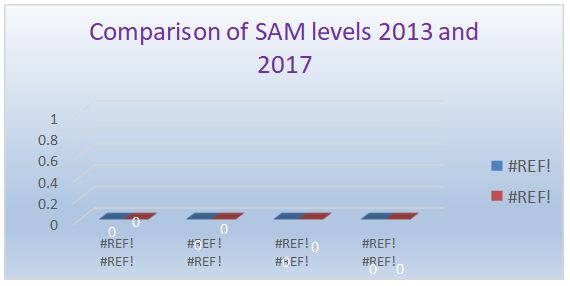
All activities conducted regarding adaptation and localization of the SAM tool were agreed upon and discussed with the top management of the Ministry of Education and participants of the event, i.e. all interested parties.
As a result of SAM tool localization activities decisions were made to apply the research results in comprehensive educational institutions: pupil, teacher, school administration, educational authorities, parents.
In the process of adaptation, the SAM tool enabled to understand that the research of the current status of teaching and quality of students' knowledge is extremely important for further improvement of teaching activities and control over the educational process. Thus, timely received information about achievements of teacher's work and learning activities of younger students would enable school organization head masters to respond to problems in a timely and prompt manner, to provide help which is targeted and to regulate the teaching and learning process using the SAM tool.
As a result of conducted studies we were convinced that the SAM tool is highly technological in terms of the content. In terms of adaptation and localization the SAM tool works perfectly in a foreign language environment.
Analysis of the state educational standard, curricula and textbooks.
In order to conduct an international research of mathematical literacy in the participating countries, each country was required to prepare an analysis of curricula and textbooks using the State Educational Standard (hereafter, SES) to identify groups of factors affecting students' development of cognitive skills (as measured based on the SAM taxonomy) in primary school mathematics courses, namely to implement:
(a) analysis of the primary school mathematics curriculum and syllabus in the Kyrgyz Republic;
(b) analysis of the total duration of primary school mathematics courses in the Kyrgyz Republic;
(c) analysis of the scope, structure and thematic content of the mathematics courses in primary school in the Kyrgyz Republic;
(d) analysis of mathematics teaching methods in the Kyrgyz Republic;
(e) analysis of the cognitive (level) content of the mathematics courses in the Kyrgyz Republic.
Task solution:
(a) The State Educational Standard of School General Education of the Kyrgyz Republic approved by the Resolution of the Government of the Kyrgyz Republic No. 403 dated July 21, 2014 (as amended by the Resolution of the Government of the Kyrgyz Republic No. 590 dated November 15, 2016, No. 496 dated August 18, 2017, No. 544 dated August 30, 2017, No. 573 dated December 7, 2018) (Ministry of Justice of the Kyrgyz Republic, 2014). The state standard is implemented through the system of regulatory documents (or curricula) which ensure education system formation on a competency basis and coordinate school education with the social mandate of the society: subject standards, curricula, educational and methodological complexes. The main purpose of the educational standard of primary school mathematics is to prepare primary school graduates to continue gaining knowledge in basic school, providing the ability to flexibly adjust to changing conditions, ensuring advancement of personal qualities (Baisalov et al., 2019).
The mathematics subject standard intended for primary school was approved by the board of the Ministry of Education and Science of the Kyrgyz Republic (MES KR) in 2015. The structure of the subject standard includes general provisions, concept of the subject, expected learning outcomes in the field of mathematics by grades and assessment and requirements for organization of mathematics learning (Kaldybaev, 2017).
The mathematics curriculum for 1-4 grades was approved by the Academic Council of the Kyrgyz Academy of Education and by the board of the Ministry of Education and Science of the Kyrgyz Republic in 2017. Analysis of the primary school curriculum used in the Kyrgyz Republic has shown that its program used at that time gives brief information about the purpose of teaching mathematics, content, methods and tools applied, and also provides brief information about organizational forms of teaching. The second part of the program indicates the content of mathematics intended for primary school. This part is considered to be the main section of the program. It also provides a number of requirements. For example, it organizes the content of materials to be taught by recommending acquired skills in the transition from grade to grade. In the structure of the program the learning function of the mathematics subject and learning objectives can be traced. The final part of the program notes requirements for the knowledge and skills of students. Teachers develop their own programs based on the general program and work with them, but they must necessarily follow the basic program approved by the Ministry of Education.
b) Analysis of the total duration of schooling and total number of hours allocated to mathematics in primary schools in the Kyrgyz Republic is presented below (see Tables 3 and 4). By 2017-2018, the number of hours allocated to mathematics in KR was almost equal to the number of hours of the primary school curriculum in the Russian Federation.
d) Analysis of mathematics teaching methods applied in the Kyrgyz Republic has shown that different methods are used depending on conditions of the actual educational process regarding implemented methods of primary school teaching. They are connected with the content of mathematical knowledge, specific goals actual at the moment, level of pupils' knowledge or skills of a teacher. At the same time, each teacher shall pay special attention to increasing student self-sufficiency and problems of student activity formation.
The main function of knowledge level determination for younger students is to identify the unconditional achievement of the students' level marked in the subject standard, in other words, to check elements of student learning activities closely related to acquisition of knowledge, skills and abilities which will be required in the next grades for successful education continuation.
(e) The main object of the research is the 4th grade mathematics textbook provided by the authors: Bekboev and Ibraeva (2009) for Kyrgyz schools and determination to what extent this textbook corresponds or solves certain problems in accordance with the methodological foundations of the SAM taxonomy research. After conducting the analysis of the main teaching "tool" – the mathematics textbook applied in the 4th grade in the Kyrgyz Republic – relevant conclusions were made regarding this textbook including general information about teaching in Kyrgyz primary school grades. It shall be also noted that there is no methodological manual for teaching mathematics in Kyrgyz fourth grades (Borisenko et al., 2020).
As we already know, the methodological basis for the SAM tool taxonomy study is related to the statement that areas for closest development of mathematics learning and subject competencies are determined on the basis of the covered material in accordance with three levels orientations (Vorontsov et al., 2011). Let us disclose the conceptuality of main levels determined for competences in mathematics:
- formal level, which implies acting based on a pattern, focusing on its external features;
- reflexive level, which implies understanding – the basis of the action manner is aspiration to essential relations;
- functional level, which implies competent actions, i.e. orientation to a certain field and setting the borders of possibilities for an action manner.
In case of reliance on the first variant of orientation the measure of generalization of an action manner is the least and is extended to a narrow range of typical situations and corresponding schemes of activities. The second variant provides an exclusive solution possibility to all types of tasks corresponding to the given manner. In case of the third variant, the action manner is characterized by functionality, or in other words, by freedom of realization in different contexts.
The constructive specifics of subject tests included in the SAM package means that task blocks are developed for each section of the curriculum content, each of which includes three tasks – Level 1, Level 2 and Level 3, forming a natural hierarchy in terms of difficulty. Such block performs the function of a detector which reveals the level of mastering a corresponding section (the level is determined by the most difficult task of the block, which was solved by the test taker). The combination of blocks, covering main sections of the program, enables participants to get a structural picture of mastery of this program by students.
The origins for development of SAM, a test tool applied to assess the quality of discipline mastery and dynamics of students' learning, is the theory of cultural development by Vygotsky (1982).
The above-mentioned analyses have a dual function. The first is complementary, i.e., they help to explain the variety of student outcomes. The second represents a stand-alone analysis of textbooks and tutorials in terms of SAM taxonomy. In order to conduct the analysis, a "technical" addition to the model was made as the zero level, to which the most "simple" tasks were provided, e.g.: 12512+475.
Analysis of the cognitive (level) content of the mathematics course (based on the mathematics textbook for 4 grade, authors - I. B. Bekboev, N. I. Ibraeva) in the Kyrgyz Republic implemented according to the SAM taxonomy showed that the textbook topic: "Numbers and quantities" (number, numbering, numerical axis, measurement units, parts of the whole) contains 442 tasks, "Arithmetic operations" (calculations, exercises with numbers) 460 tasks, i.e. the maximum number of tasks, which are connected with the specifics of learning mathematics in primary school. At the same time the textbook contains very few tasks needed for establishment of regularities, sequences, dependencies and modeling, i.e. tasks in which a student has an opportunity to develop the logical thinking and modeling skills (see Table 5). There are only 5 such tasks in the textbook, which is 0.32% of the total number, i.e. they are practically absent.
The research team members were concerned that 65% of all tasks were provided at the level L1. Only 108 tasks were related to the level L2, which was about 7% of the total number of all tasks. Unfortunately, there were no tasks at the level L3 in this textbook. This is the main textbook, and 56.1% (according to the National Statistical Committee of the Kyrgyz Republic) of fourth-graders in the Kyrgyz Republic use it. 433 material revision tasks (1st and 2nd grades), which is 28% of the total number of tasks in this textbook, were assigned to the zero level L0.
Findings
Sampling
The sampling of respondents from Kyrgyzstan amounted to 1,017. The Standards for Primary School Education Quality Assessment International Study were followed. The following diagrams show distribution of respondents by gender (see Figure 2).
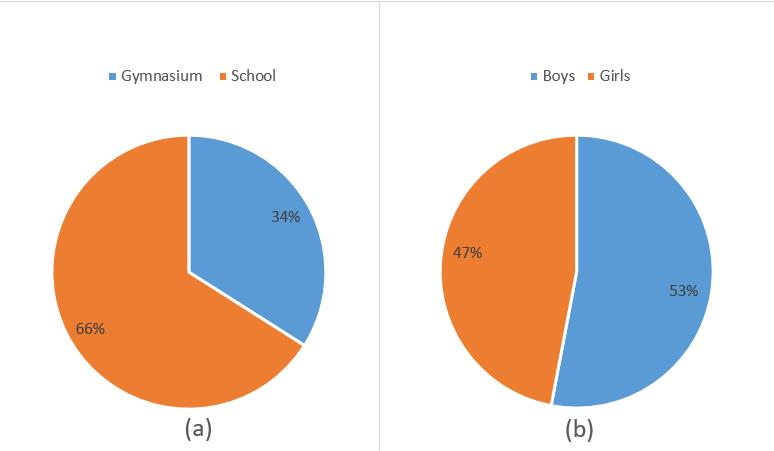
Mean value, standard deviation
On a 1,000-score scale (see Figure 3):
- Maximum score – 551;
- Minimum score – 205;
- Average score – 420;
- Standard deviation – 54
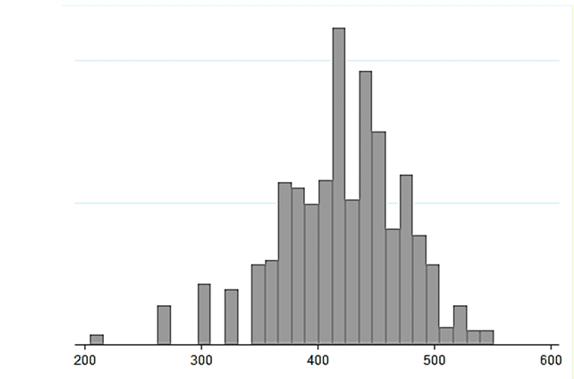
Achievement threshold scores were determined to be the following:
- Level 0 – less than 430 scores.
- Level 1 – 430 scores
- Level 2 – 500 scores
- Level 3 – 570 scores
The average result of Kyrgyz students which is equal to 420 scores shows that it is located below the threshold set for Level 1.
Distribution of SAM levels
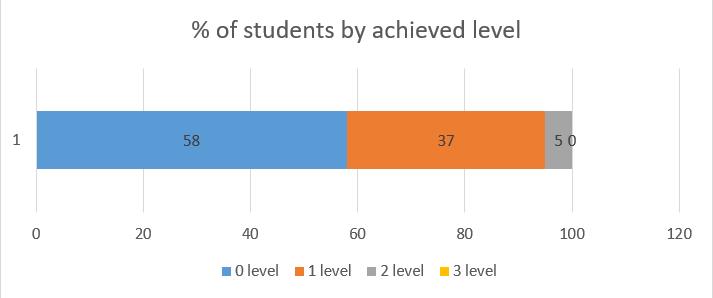
The percentage distribution of students by SAM level shows that 58%, i.e. more than a half of students, are at Level 0, 37% of students have reached Level 1, only 5% of students are at Level 2, and no one has reached Level 3. In some cases, there are students from schools who have reached Level 3, but their number was statistically insignificant in the percentage distribution of students by SAM levels (see Figure 4).
Percentage of coped tasks for each level
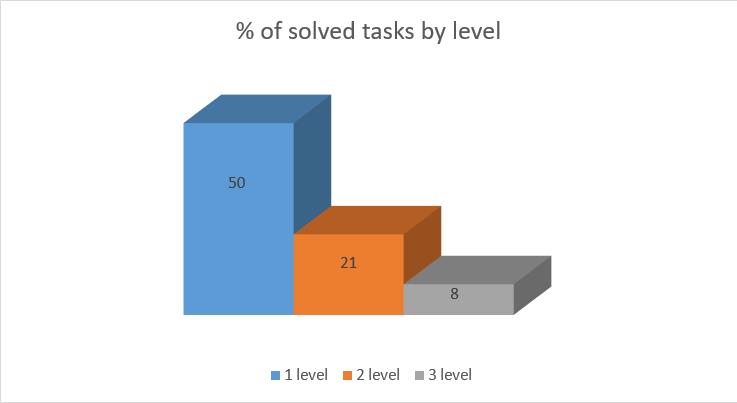
The obtained results related to the research IRSA 2019 (see Figure 5) enabled to summarize the fact that the low results of students included in the research are not accidental and confirm the need to organize the system of control for effective management of the quality of education in general educational institutions of the republic, and also point at the need to develop modern textbooks and teaching aids in accordance with new standards.
Conclusion
It should be also mentioned that the main advantages of SAM are connected with assessment of individual achievements of students, with the possibility of identifying individual students who are able to apply the acquired knowledge in non-standard situations, with the possibility of introducing adjustments to a program or a teaching methodology to motivate each student to acquire knowledge.
At the same time, the process of changing the State Educational Standards and curricula of primary school is currently underway in the Kyrgyz Republic.
The stated documents will be based on the competency-based approach to learning and we hope that the situation will be changed for the better in terms of education of primary school students.
References
Baisalov, D. U., Kazieva, G. K., & Uzakova, M. K. (2019). Usovershenstvovanie matematicheskikh uchebnykh sredstv nachal’nykh shkol v Kyrgyzskoi Respublike [Improvement of mathematical teaching tools in primary schools in the Kyrgyz Republic]. In L. V. Baiborodova (Ed.), Pedagogika I psikhologiya sovremennogo obrazovaniya: teoriya I praktika. Materialy 73 nauchno-prakticheskoi konferencii: Vol. 3. Chteniya Ushinskogo [Pedagogy and psychology of modern education: theory and practice: Proceedings of the 73th scientific and practical conference: (Vol. 3, pp. 140-145). RIO YaGPU.
Bekboev, I. B., & Ibraeva N. I. (2009). Matematika: 4 klass [Mathematics: Year 4]. Bilim-komp’yuter.
Borisenko, T. F., Petuhova, N. N., & Saltuganova, M. M. (2020). Formula umeniya reshat' tekstovye zadachi v nachal'noj shkole: opisanie praktiki [Formula of Ability to Solve Written Math Problems in Primary School: the Description of Practice]. Education Quality in Eurasia, 7, 60-65. https://eaoko.org/ru/publications/detail.php?ELEMENT_ID=167
Federyakin, D. A., Larina, G. S., & Kardanova, E. Yu. (2021). Measuring Basic Mathematical Literacy in Elementary School. Educational Studies Moscow, 2, 199-226. https://vo.hse.ru/data/2021/08/04/1425443560/Federiakin,%20Larina,%20Kardanova%20EN.pdf
Froumin, I. D., Dobryakova, M. S., Barannikov, K. A., & Remorenko, I. M. (2018). Universal'nye kompetentnosti i novaya gramotnost': chemu uchit' segodnya dlya uspekha zavtra. Predvaritel'nye vyvody mezhdunarodnogo doklada o tendenciyah transformacii shkol'nogo obrazovaniya [Universal competencies and new literacy: what to teach today for tomorrow's success. Preliminary conclusions of the international report on trends in the transformation of school education]. HSE. https://ioe.hse.ru/data/2018/07/12/1151646087/2_19.pdf
Kaldybaev S. K. (2017) O sisteme ocenivaniya v shkol'nom obrazovanii Kyrgyzstana [Evaluation system in school education of Kyrgyzstan]. Education Quality in Eurasia, 3, 69-80. https://eaoko.org/upload/journal/No5/5_69-80.pdf
Kaldybaev, S. K., & Kadyrova, Z. A. (2020). Learning achievements and their assessment. Alatoo Academic Studies, 15(3), 45-54. https://drive.google.com/file/d/16QeZNQwu1a_G35IQbWL_JB7o2FR6VxWr/view
Kellaghan, Th., & Greaney, V. (2019). Public Examinations Examined. World Bank. https://openknowledge.worldbank.org/handle/10986/32352
Kennedy, K., Peters, M., & Thomas, M. (2017). Kak ispol'zovat' analiz dannyh o dobavlennoj stoimosti dlya uluchsheniya obucheniya shkol'nikov: rukovodstvo dlya shkol i liderov shkol'nyh okrugov [How to Use Value-Added Analysis to Improve Student Learning: A Field Guide for School and District Leaders]. In O. Lobachyova, Trans., & L. Lyubimova (Eds.). HSE University Publishing House. https://id.hse.ru/data/2016/11/16/1110224548/%D0%9A%D0%B5%D0%BD%D0%BD%D0%B5%D0%B4%D0%B8_%D1%82%D0%B5%D0%BA%D1%81%D1%82_%D1%81%D0%B0%D0%B9%D1%82.pdf
Ministry of Education and Science of the Kyrgyz Republic (2018). Nacional'noe ocenivanie obrazovatel'nyh dostizhenij uchashchihsya (NOODU) 2017 g. Otchet Centra ocenki v obrazovanii i metodov obucheniya (COOMO) [National Assessment of educational achievements of students 2017. Report of the Center for Evaluation in Education and Teaching Methods]. https://edu.gov.kg/media/files/fa89cc70-d2ac-4419-9e22-651bdff187f8.pdf
Ministry of Justice of the Kyrgyz Republic (2014). Postanovlenie Pravitel'stva KR ot 21 iyulya 2014 goda № 403 "Ob utverzhdenii Gosudarstvennogo obrazovatel'nogo standarta srednego obshchego obrazovaniya Kyrgyzskoj Respubliki" [Resolution of the Government of the Kyrgyz Republic dated July 21, 2014 No. 403 "On approval of the State Educational Standard of Secondary general education of the Kyrgyz Republic"]. http://cbd.minjust.gov.kg/act/properties/ru-ru/96690/30
Ministry of Justice of the Kyrgyz Republic (2021, May 04). Programma razvitiya obrazovaniya v Kyrgyzskoj Respublike na 2021 − 2040 gody. Prilozhenie 1 (k postanovleniyu Pravitel'stva Kyrgyzskoj Respubliki ot 4 maya 2021 goda № 200) [Education Development Program in the Kyrgyz Republic for 2021-2040. Appendix 1 (to the Resolution of the Government of the Kyrgyz Republic dated May 4, 2021 No. 200)]. http://cbd.minjust.gov.kg/act/view/ru-ru/158227
Vorontsov, A. B., Lvovsky, V. A., & Nezhnov, P. G. (2011). Monitoring uchebno-predmetnyh kompetencij shkol'nikov (SAM): potencial i vozmozhnosti instrumentariya [Monitoring of educational and subject competences of schoolchildren (SAM): the potential and possibilities of the toolkit]. http://www.myshared.ru/slide/56856/
Vygotsky, L. S. (1982). Myshleniye i rech' [Thinking and speech]. In V. V. Davydov (Ed.), Sobranie sochinenij v 6-I tomakh. Tom 2. Problemy obshchej psikhologii [Collected works: In 6 vols. Vol. 2. Problems of general psychology] (pp. 5-361). Pedagogika.
Zhamakeeva, Z. E., Kaldybaev, S. K., & Shamshidinova, B. S. (2015). Ispol'zovanie instrumenta SAM v ocenivanii matematicheskoj gramotnosti v nachal'noj shkole Kyrgyzskoj Respubliki [Applying the SAM testing for assessment of mathematic literacy in the Kyrgyz Republic primary schools]. Education Quality in Eurasia, 3, 89-113. https://eaoko.org/upload/journal/No3/3_89-113.pdf
Zhamakeeva, Z. E., Mamytova, I. A., Umralieva, S. K., & Dautova, D. S. (2017). Faktory, vliyayushchie na uroven' obrazovatel'nyh dostizhenij obuchayushchihsya v nachal'nyh klassah (CAPSA) v Kyrgyzskoj Respublike [Influencing factors on the level of educational achievements of students in the primary school (CAPSA) in the Kyrgyz Republic]. Education Quality in Eurasia, 5, 19-34. https://eaoko.org/upload/journal/No5/5_19-34.pdf
Zhamakeeva, Z., Kaldybaev, S. K., & Shamshidinova, B. (2016). Assessment of mathematical literacy in elementary school. Teoriya i praktika sovremennoj nauki [Teoriya i praktika sovremennoj nauki], 9(15), 9 - 18. https://www.modern-j.ru/_files/ugd/b06fdc_43c047a8038040f5ba3916b07c6d5ac4.pdf
Copyright information

This work is licensed under a Creative Commons Attribution-NonCommercial-NoDerivatives 4.0 International License.
About this article
Publication Date
22 April 2022
Article Doi
eBook ISBN
978-1-80296-956-6
Publisher
European Publisher
Volume
3
Print ISBN (optional)
-
Edition Number
1st Edition
Pages
1-310
Subjects
Education quality, education assessment, education and city, urban education, lifelong learning, Big Data in education
Cite this article as:
Zhamakeeva, Z. E., Kazieva, G. K., & Shamshidinova, B. S. (2022). Status of Mathematics Literacy in Primary School of the Kyrgyz Republic. In S. Vachkova, & S. S. Chiang (Eds.), Education and City: Quality Education for Modern Cities, vol 3. European Proceedings of Educational Sciences (pp. 297-310). European Publisher. https://doi.org/10.15405/epes.22043.26

